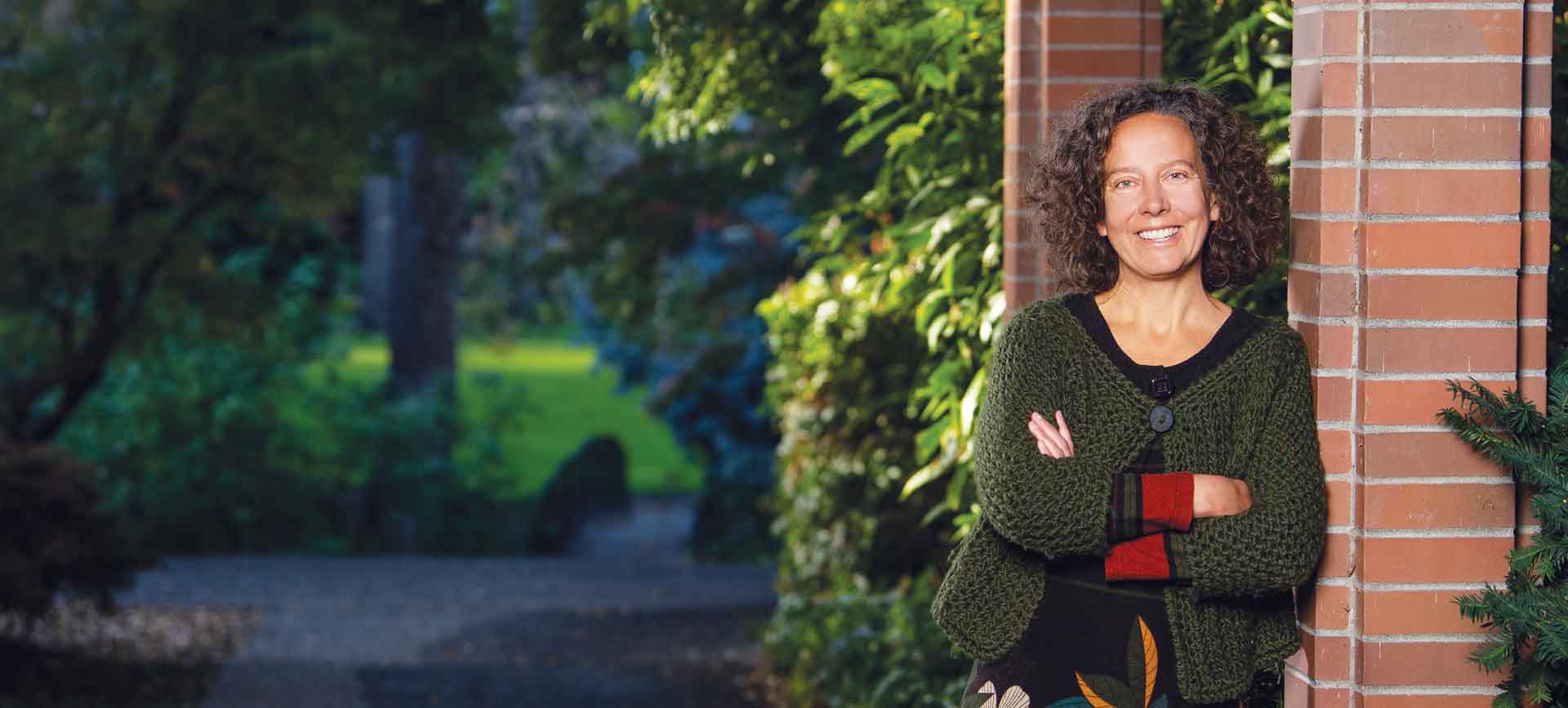Exploring the History of Belonging

Anthropologist Eunice Blavascunas’ research and teaching are rooted in culture, place and justice.
Białowieza, Poland, and Joseph, Oregon, are more than 5,000 miles apart. Białowieza is surrounded by primeval forest, a mix of deciduous swamps and evergreen groves. Joseph is tucked among the vast stands of pine, spruce and fir in the Wallowa-Whitman National Forest.
In Poland, communities remain marked by the traumas of World War II and ethnic violence between Poles and Belarusians. At the same time, marginalized Oregonians face legacies of settler colonialism, racial exclusion and broken treaties.
These two distinct forested settings unite in the research and teaching of Eunice Blavascunas, associate professor of anthropology and environmental studies at Whitman College.
Both are complex ecosystems, biologically and culturally. Residents wrestle with questions about logging, jobs, endangered species and how to pursue justice given these complex pasts.
“The borderlands of eastern Poland and what’s happening in eastern Washington or eastern Oregon are very far apart, but there are ways in which we see similar processes of who belongs in a landscape,” Blavascunas says. “What is that history of belonging?”
No place is without a human narrative about its past.”—Eunice Blavascunas, from her book “Foresters, Borders, and Bark Beetles: The Future of Europe’s Last Primeval Forest”
Blavascunas is a cultural anthropologist who studies land and conservation conflicts in relation to parks and protected areas and has spent more than 20 years researching and writing about Eastern Europe.
Her 2020 book, “Foresters, Borders, and Bark Beetles: The Future of Europe’s Last Primeval Forest” (Indiana University Press), is the result of her decades of research about the people and culture of the Białowieza Forest.
In the spring of 2022, Blavascunas will turn her attention to the Western United States with the introduction of a special class. She and other Whitman professors will lead an immersive field course that takes students to Joseph and other locations across the Inland Northwest. “Land Water Justice: Envisioning the Next West” will connect students with westerners who are both enmeshed in experiences of racial and climate injustice and seeking solutions.
‘Complex and Messy’
Fittingly, Blavascunas began her career with the U.S. Forest Service. As a college student, she was fascinated by revolutions in Eastern Europe and learned about the Białowieza Forest from Polish foresters she met while working on the Olympic Peninsula.
She received grants to conduct research in Białowieza throughout her time earning a master’s in geography at the University of Texas at Austin and a doctorate in cultural anthropology at the University of California, Santa Cruz.
In 2015, she returned to the Pacific Northwest and began her professorship at Whitman. Her commitment to cross-discipline scholarship was an ideal fit for Whitman’s Environmental Studies Program, which requires students to take courses in the natural sciences, social sciences and humanities.
“I think environmental studies is one of the only fields that really asks you to try to hold all of those things, and it shows you how complex and messy that is,” she says.
And the interplay across those disciplines does lead to complex, and sometimes challenging, conversations, Blavascunas says—but it’s critical to conducting research that not only sounds the alarm about environmental problems, but also leads to action.
Envisioning the ‘Next West’
“Land Water Justice,” a tuition-free course, is part of the Pacific Northwest Just Futures Institute for Racial and Climate Justice, a multi-university partnership funded by a $4.5 million Andrew W. Mellon Foundation grant. Phil Brick, Whitman’s Miles C. Moore Professor of Political Science, and Stan Thayne, a visiting assistant professor of anthropology and religion, will join Blavascunas in teaching the course.
Students will meet with community partners, including Indigenous, Black and Latinx leaders who are doing on-the-ground work related to climate and racial justice. The students will create podcasts from their conversations, which Blavascunas says will allow them to learn to deeply listen to people’s stories and meaningfully retell them with consideration for who the stories belong to.
In the process, they’ll explore how what they learn could transform the region into the ‘Next West,’ a place that remembers its past, for better or worse, while imagining a just future.
In Joseph, for example, they will learn about the town’s namesake, Chief Joseph, and the Nez Perce Wallowa Homeland project’s efforts to return land to the tribe. They’ll also be collaborating with Gwen Trice, founder of the Maxville Heritage Interpretive Center, which tells the stories of African American families who lived in Maxville—once a 1920s and ’30s timber town, now a ghost town.
“I see my role in this course not in the traditional professorial sense of I am using my expertise on a subject matter, but rather as an animator and a facilitator between students and community partners, community partners who are doing the grounded and challenging work of being people of color and living in majority white rural areas,” Blavascunas says.
Forging Ahead
Though her field course will focus on the Pacific Northwest, Blavascunas’ research remains unbounded by region or discipline.
She’s exploring topics such as the effects of “rewilding” animals in Europe and in North America, the impacts of a dredging project near Chernobyl, and how people across the globe think about the movements of wild animals and their kinship to them.
Blavascunas seeks to reach beyond an audience of scholars and show people—whether in an ancient Polish forest, the mountains of the Inland Northwest or the campus of Whitman College—that another world is possible.